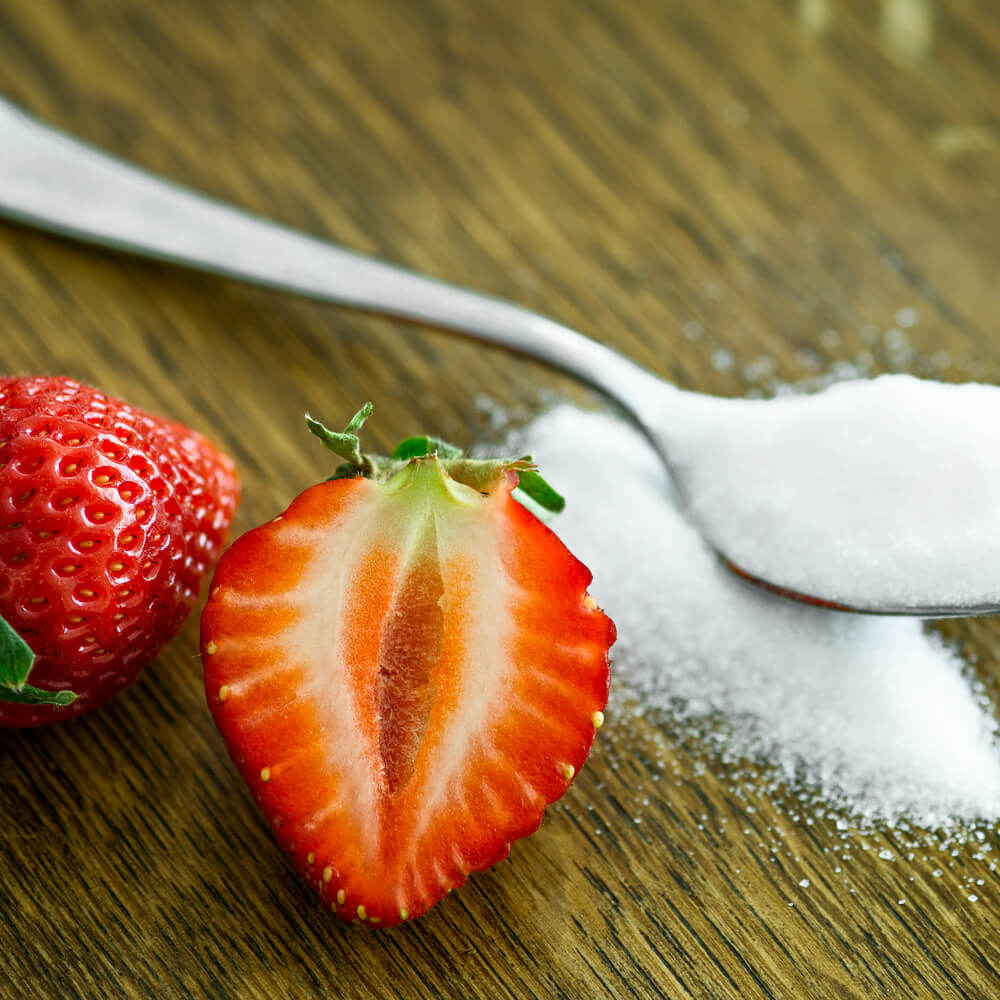Sugar comes in various forms. Its simplest forms are glucose and fructose. These compounds can bind to each other in pairs or longer chains, creating carbohydrate molecules that our body utilises for energy production.
The most common form of sugar that we are all familiar with, is table sugar, which dissolves in water and gives food a sweet taste. It is called sucrose and consists of glucose and fructose crystals. This type of sucrose is commonly referred as “processed sugar”, but there are other unprocessed foods that are high in simple sugars, such as honey (which is equally high in glucose and fructose). Hence from this point of view, honey it is practically sugar (1).
As these carbohydrate chains become longer, the sweet taste, as well as the water solubility lessens (2). These large chains are called polysaccharides and form what we call starchy foods, such as rice, bread, spaghetti, and potatoes.
Hence, sugar is present in the most of the meals we consume, and this is really good, because biologically our body is made to burn sugar, and it does so quite efficiently.
Almost every part of our body is made of cells, and these cells help us to breathe, to think and much more. Their work may be different, but they definitely have one thing in common.
That we must supply them with energy in order for them to survive and perform the necessary process that was built to.
But in order for the cells to be fed, they need to convert the nutrients from our diet into a different form of energy. A form of energy that they can use. This form of energy is called ATP. Towards this direction, I will simply tell you that the ATP production process starts with glucose.
So, glucose is what feeds our cells. When we consume foods that are high in glucose, such as soft drinks, then glucose enters directly into the bloodstream and is ready to be used. Also, when we consume starchy foods, then they are digested in order to break down these large carbohydrate chains into smaller ones, giving -again- glucose as final product.
If for some reason we do not get carbohydrates from our diet, cells can convert fat and protein into glucose.
Why?
Because they need / prefer glucose to survive.
This is where sugar and cancer was born, because cancer is a disease of the cells.
Cancer cells usually grow fast, multiply rapidly, and obviously take a lot of energy to do that. Hence, cancer cells need a lot of glucose (3). This is where the hypothesis that links sugar and cancer was born: If cancer cells need a lot of glucose, and we eliminate glucose intake, the growth of cancer cells will stop, or even their growth will be avoided right from the beginning.
Unfortunately it is not that simple. All our cells need glucose, and there is no way to learn our cells how to use all the glucose they need and not to give it to cancer cells.
And let me remind you, as I said before, not only sugar, but also spaghetti, rice, and anything that contains carbohydrates at the end of the day will turn into blood glucose. Not only that, but some amino acids can be used to form glucose.
Therefore, there is generally no evidence that adhering to a sugar-free diet will reduce the risk of cancer or increase the chances of overcoming the disease quickly. Furthermore, in an extreme scenario, restrictive diets -if followed for a long time-, can lead to very negative health consequences, because food restriction will usually lead to nutritional deficiencies, and in this case, vitamins, and fiber. (4).
This fact is even more important for patients diagnosed with cancer, as many of the therapeutic approaches can lead the body to such stress that the combination with restrictive diets can further hinder recovery.
"May I eat as much sugar as I want?"
We usually say that one should reduce sugar consumption due to an indirect relationship between sugar and cancer. And what is this relationship?
The relationship between increased body weight and cancer (5).
Observation studies have correlated sugar consumption with various biological mechanisms that lead to the consumption of more calories, and thus weight gain. This, in turn, is crucial, as obesity greatly increases the risk of different types of cancer.
Importantly, obesity is second greatest modifiable lifestyle risk factor of cancer, after smoking (6).
We must also make it clear that in this particular case I am referring to simple sugars, and especially to added sugars, not for example those sugars found naturally in fruits, milk or even various starchy foods.











